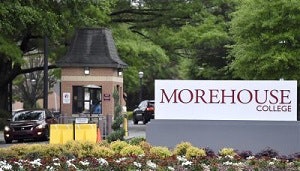When Dr. Lycurgus L. Muldrow went to college, he was reading at a 7th-grade level. He’d dealt with health issues as a kid, and like many Black students, he found himself underserved by his school system, despite both of his parents serving as faculty members at historically Black colleges and universities.
Now, after attending an HBCU himself, he serves as the executive director of the HBCU Undergraduate Success Research Center, a new initiative by Morehouse College funded by a $9 million grant from the National Science Foundation, which aims to study STEM education programs at historically Black colleges and universities.
“The reality is, despite the extremely positive contribution that HBCUs make in STEM education, in the literature and in the nation, there’s still a deficit-oriented discourse concerning HBCUs’ contributions to society,” said Muldrow, also director in the Office of Academic Affairs at Morehouse.
“Through the supportive mechanism of the HBCUs, I discovered resilience,” he added.
The HBCU Undergraduate Success Research Center, otherwise known as STEM-US, will ultimately research successful STEM programs from 50 HBCUs, collecting data and ultimately sharing best practices in bringing students majoring in STEM disciplines from underrepresented backgrounds to graduation. Part of the grant will be shared with Spelman College and Virginia State University, as well.
Dr. Michael E. Hodge, Morehouse’s provost, wants to see the center become “a clearinghouse, a repository, a generator of information and knowledge and innovation” when it comes to educating Black students, he said, but also students in general. “I think that’s the legacy. This will be the center that’s pointed to as the center that created the space and scale to demonstrate the true capacity and genius in every student to be productive contributors to society.”
At the center, an interdisciplinary team of scholars will work on six different research initiatives, all “converging around” the same theoretical framework called the Phenomenological Variant of Ecological Systems Theory, or PVEST.














